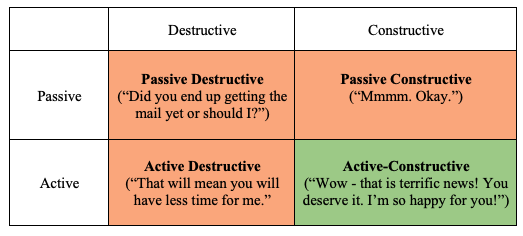Good news: sharing and responding
Author: J. MacLaren Kelly, MAPP, PhD
Think of the last time you shared good news with others close to you. How did it feel to do so? Relatedly, how did the person respond to your good news? A brief congrats? A high five? Maybe just a nod to confirm they heard you? It turns out that sharing good news with others supports your well-being and how you respond to someone else’s good news matters too.
When someone close to you discloses that they’re struggling in some manner, it may be easy to list ways you provide social support. Perhaps you pause, sit down with them, validate their emotional pain, give them a hug, or talk through possible solutions. However, how do you respond when things go well? Your response may be less obvious. It turns out that one particular way of responding is best.
Sharing good news with others supports your well-being
When someone shares good news with you, they typically seek your joining with them in celebrating the event, extending the positive feelings derived from the event itself. This process is known as capitalization (Langston, 1994). In a series of studies, Gable, Reis*, Impett, & Asher (2004) found that capitalization was associated with greater positive emotion and life satisfaction on the day when positive news was shared. This result remained significant even after accounting for other events that day, and the positive emotions derived from the event itself. Sharing positive news with others supports your well-being beyond the experience of the positive event itself.
But wait, there’s more…
How you respond to someone else’s good news matters too.
How someone responds to your sharing of good news also matters. Gable et al. (2004) studied four possible ways of responding to good news. To elucidate each response type, consider a scenario in which someone returns home and shares news of a job promotion with their partner.

A passive-destructive response refers to the ignoring of the event/changing of topics when positive news is shared with them. An active-destructive response refers to overtly reminding the sharer of good news that there will be costs of the good news. A passive-constructive response refers to a tempered, slightly supportive response, perhaps an improvement on the first two but still has room to improve. Finally, an active-constructive response refers to an unambiguously supportive and enthusiastic response. An active-constructive response shows the sharer of news that you hear them, recognize their news as important, acknowledge their efforts, and join with them in feeling good about it. When the sharer of news thought the listener responded active-constructively, their individual well-being and relationship quality (trust, intimacy, satisfaction, commitment) were rated even higher (Gable et al., 2004).
Later work studied these effects over time and compared them to responses to negative events (Gable, Gonzaga, & Strachman, 2006). In a study of nearly 80 couples, the manner in which one responded to their partner’s positive news was more closely related to relationship well-being and breakups collected two months later than were responses to negative events. How you respond to your partner’s report of good events matters just as much, if not more, than your responses to negative events.
|
Take home points are:
|
If you are struggling with stress, anxiety, or depression, then consider giving Behavioral Health Partners a call at (585) 276-6900.
Footnotes
* Harry Reis is a renowned social psychologist and professor at University of Rochester.
**Okay, that wasn’t covered and certainly a matter for additional consideration. Good job reading to the end of this article!
References
Gable, S. L., Reis, H. T., Impett, E. A., & Asher, E. R. (2004). What do you do when things go right? The intrapersonal and interpersonal benefits of sharing positive events. Journal of Personality and Social Psychology, 87(2), 228–245. https://doi.org/10.1037/0022-3514.87.2.228
Gable, S. L., Gonzaga, G. C., & Strachman, A. (2006). Will you be there for me when things go right? Supportive responses to positive event disclosures. Journal of Personality and Social Psychology, 91(5), 904–917. https://doi.org/10.1037/0022-3514.91.5.904
Langston, C. A. (1994). Capitalizing on and coping with daily-life events: Expressive responses to positive events. Journal of Personality and Social Psychology, 67, 1112–1125.
2/1/2024




